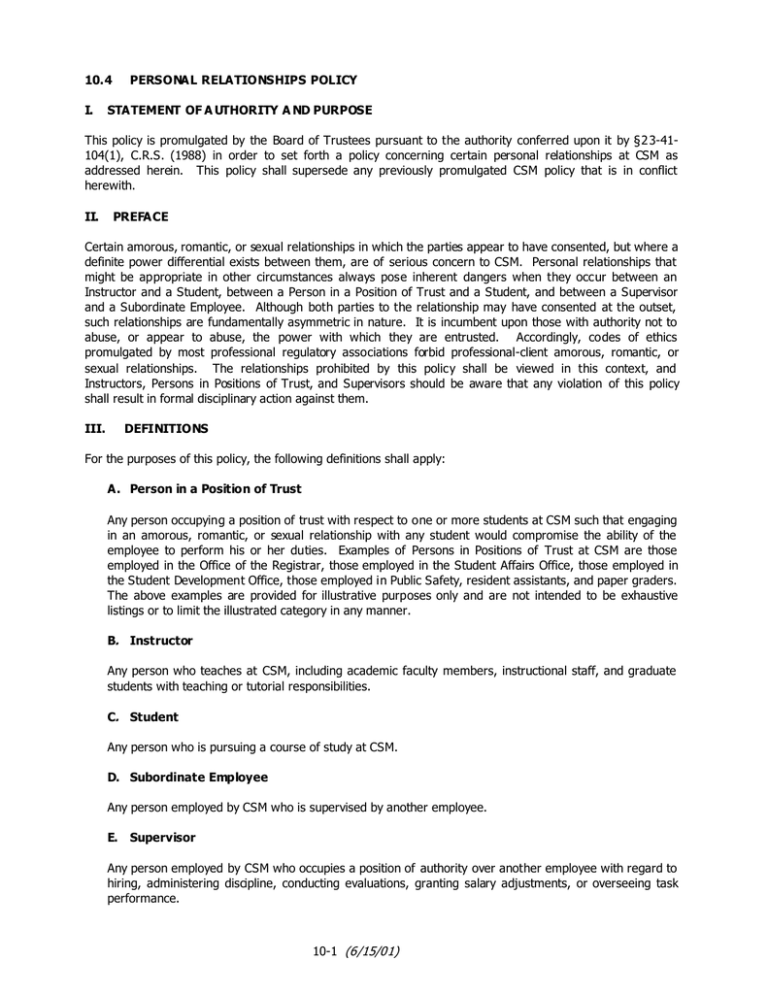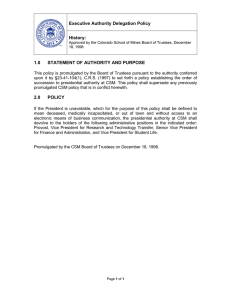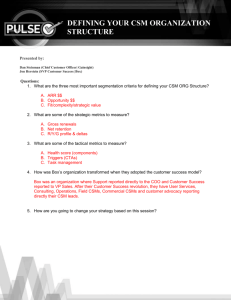
10.4
I.
PERSONAL RELATIONSHIPS POLICY
STATEMENT OF A UTHORITY A ND PURPOSE
This policy is promulgated by the Board of Trustees pursuant to the authority conferred upon it by §2 3-41104(1), C.R.S. (1988) in order to set forth a policy concerning certain personal relationships at CSM as
addressed herein. This policy shall supersede any previously promulgated CSM policy that is in conflict
herewith.
II.
PREFACE
Certain amorous, romantic, or sexual relationships in which the parties appear to have consented, but where a
definite power differential exists between them, are of serious concern to CSM. Personal relationships that
might be appropriate in other circumstances always pose inherent dangers when they occur between an
Instructor and a Student, between a Person in a Position of Trust and a Student, and between a Supervisor
and a Subordinate Employee. Although both parties to the relationship may have consented at the outset,
such relationships are fundamentally asymmetric in nature. It is incumbent upon those with authority not to
abuse, or appear to abuse, the power with which they are entrusted. Accordingly, codes of ethics
promulgated by most professional regulatory associations forbid professional-client amorous, romantic, or
sexual relationships. The relationships prohibited by this policy shall be viewed in this context, and
Instructors, Persons in Positions of Trust, and Supervisors should be aware that any violation of this policy
shall result in formal disciplinary action against them.
III.
DEFINITIONS
For the purposes of this policy, the following definitions shall apply:
A. Person in a Position of Trust
Any person occupying a position of trust with respect to one or more students at CSM such that engaging
in an amorous, romantic, or sexual relationship with any student would compromise the ability of the
employee to perform his or her duties. Examples of Persons in Positions of Trust at CSM are those
employed in the Office of the Registrar, those employed in the Student Affairs Office, those employed in
the Student Development Office, those employed in Public Safety, resident assistants, and paper graders.
The above examples are provided for illustrative purposes only and are not intended to be exhaustive
listings or to limit the illustrated category in any manner.
B. Instructor
Any person who teaches at CSM, including academic faculty members, instructional staff, and graduate
students with teaching or tutorial responsibilities.
C. Student
Any person who is pursuing a course of study at CSM.
D. Subordinate Employee
Any person employed by CSM who is supervised by another employee.
E. Supervisor
Any person employed by CSM who occupies a position of authority over another employee with regard to
hiring, administering discipline, conducting evaluations, granting salary adjustments, or overseeing task
performance.
10-1 (6/15/01)
IV.
POLICY
A. Personal Relationships Between Instructors and Students in the Instructional Context
No Instructor shall engage in an amorous, romantic, or sexual relationship, consensual or otherwise, with
a Student who is enrolled in a course being taught by the Instructor, or whose academic work is being
supervised by the Instructor.
B. Personal Relationships Between Instructors and Students Outside the Instructional
Context
In a personal relationship between an Instructor and a Student for whom the Instructor has no current
professional responsibility, the Instructor should be sensitive to the constant possibility that he or she may
unexpectedly be placed in a position of responsibility for the instruction or evaluation of the Student. This
could entail a request to write a letter of recommendation for the Student or to serve on an acade mic
committee involving the Student. In addition, an awareness should be maintained that others may
speculate that a specific power relationship exists even when none is present, giving rise to assumptions
of inequitable academic or professional advantage for the Student. Even if potential conflict of interest
issues can be resolved, charges of sexual harassment may arise. In such situations, it is the Instructor
who, by virtue of his or her special responsibility, shall be held accountable for unprofessional behavior.
C. Personal Relationships Between Supervisors and Subordinate Employees
No Supervisor shall engage in an amorous, romantic, or sexual relationship, consensual or otherwise, with
a Subordinate Employee who reports, either directly or indirectly, to the Supervisor or is under the
Supervisor's direct or indirect authority.
D. Personal Relationships Between Persons in Posit ions of Trust and Students
No Person in a Position of Trust shall engage in an amorous, romantic, or sexual relations hip, consensual
or otherwise, with a Student.
Promulgated by the CSM Board of Trustees on February 14, 1992.
Amended by the CSM Board of Trustees on June 18, 1992.
10-2 (6/15/01)
10-3 (6/15/01)


